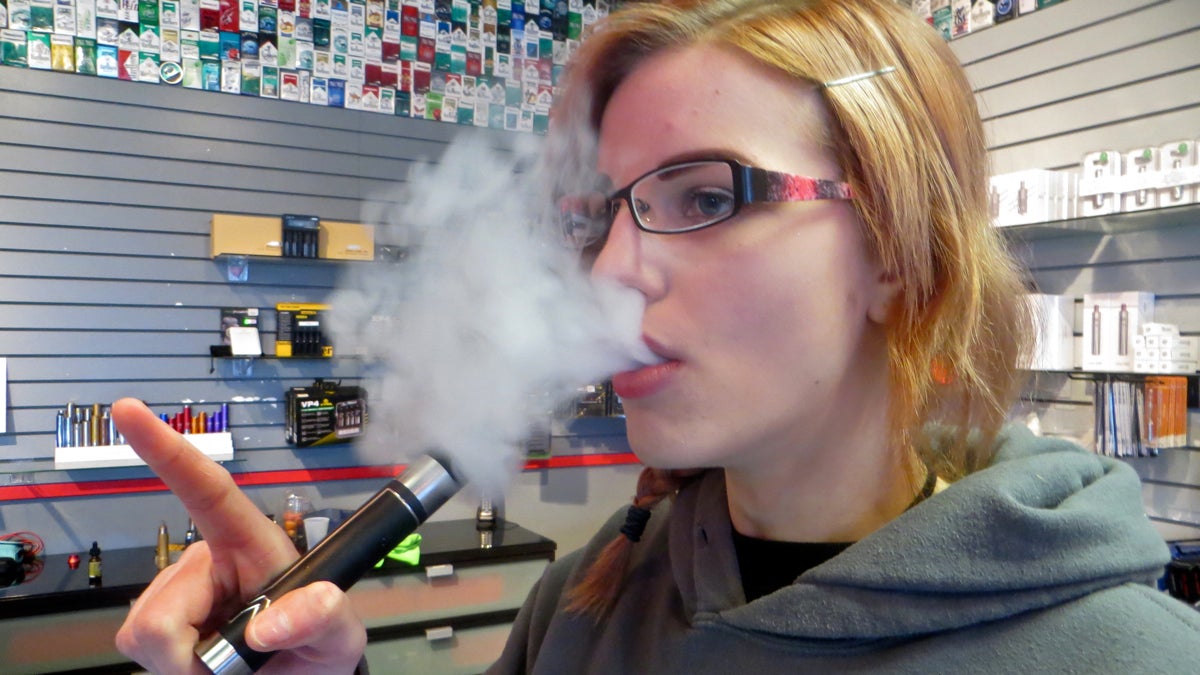Delaware lawmakers face opposition from former smokers on e-cigarette restrictions

Delaware Vapor assistant manager Emily Skelton, 20, says she started smoking combustible cigarettes at age 12. Now she's been vaping for a year. (Taunya English/WHYY)
Opponents of a Delaware plan to forbid electronic cigarette use in restaurants, bars and other indoor public spaces say they’ll converge on Legislative Hall in Dover Wednesday to argue against the bill.
E-cigarettes are battery-powered devices. When “lit,” the liquid inside heats up and vaporizes. Many smokers say they have been able to give up tobacco cigarettes by switching to the devices.
Brendan Styles, general manager of Delaware Vapor a Newark shop that sells electronic cigarettes, said lawmakers should be ready for a fight — and a big contingent of former smokers who’ve made the switch.
“They probably got more of a response than they thought they were going to get,” he said.
Delaware Vapor offers a “juice bar” where shoppers puff and taste-test the flavored liquids used inside electronic cigarettes. If the proposal before the legislature succeeds, the shop’s juice bar would have to close.
“The Clean Indoor Air Act that passed in Delaware in 2002, did not have an exemption for cigar stores or tobacco stores, and none of those have gone out of business,” said state Rep. Debra Heffernan, who sponsored the new bill.
A similar bid last year failed, but Heffernan said more information on electronic-cigarette emissions is bolstering her effort.
In a letter to Heffernan (read below), a senior medical officer with the U.S. Centers for Disease Control and Prevention’s Office on Smoking and Health summarized some of the scientific evidence available on electronic nicotine delivery systems, including e-cigarettes.
“They are sure that it is not as safe as clean air and that it does have risks,” said Heffernan, who represents the Brandywine section of New Castle County.
“ENDS [electronic nicotine delivery systems] aerosol is not ‘water vapor,'” the letter said. “It contains nicotine and can contain additional toxins, and thus, it is not as safe as clean air.”
A ban on electronic cigarettes in public spaces will protect bystanders and non-smokers, Heffernan said.
Meanwhile, those in favor of the devices say electronic cigarettes are helping tobacco smokers kick the habit. Thousands of former smokers have shared their stories, said Alex Clark, legislative director of the nonprofit group Consumer Advocates for Smoke-free Alternatives Association.
“In a lot of cases, people are using these products to cut down. And, eventually, lots of people use these products to completely wean themselves off of nicotine,” Clark said.
While the federal government deliberates on how — or if — it will regulation nicotine-delivery devices, many local governments and states are enacting their own laws.
“From a policy perspective, people have decided to treat these products just like cigarettes, which we feel is not appropriate,” Clark said.
He noted an investigation from a Drexel University researcher that concludes: “Current state of knowledge about chemistry of liquids and aerosols associated with electronic cigarettes indicates that there is no evidence that vaping produces inhalable exposures to contaminants of the aerosol that would warrant health concerns by the standards that are used to ensure safety of workplaces.”
Many smoke-free workplaces let workers puff electronic cigarettes at their desk, Clark said, adding that property owners should be allowed to set their own policies.
“Any regulation that treats vaping like smoking (other than age restrictions) is inappropriate and sends a confusing message to consumers,” Clark said by email.
DV.load(“//www.documentcloud.org/documents/1697565-cdc-letter-of-evidence-on-electronic-nicotine.js”, {
width: 600,
height: 600,
sidebar: false,
text: false,
container: “#DV-viewer-1697565-cdc-letter-of-evidence-on-electronic-nicotine”
});
CDC Letter of Evidence on Electronic Nicotine Delivery Systems Delaware March 2015 (PDF)
CDC Letter of Evidence on Electronic Nicotine Delivery Systems Delaware March 2015 (Text)
WHYY is your source for fact-based, in-depth journalism and information. As a nonprofit organization, we rely on financial support from readers like you. Please give today.

